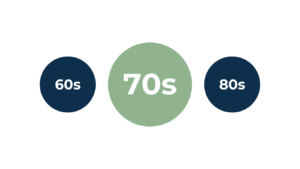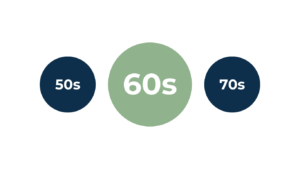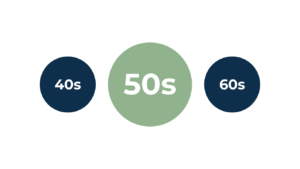
Milestone Ages – 62
Age Based PlanningOct 30, 2024
Many people we talk to target age 62 for retirement. Unfortunately, when we talk about healthcare costs and when they are eligible for Medicare, the goal is often changed to 65 or even later in some cases. The reason many people target age 62 is because that is when people are eligible to take Social Security. There are some things that should be considered before making that decision because being eligible does not mean you have to take it.
While eligibility starts at age 62, your Social Security benefit is offered at a reduced rate. In order to receive your full amount, you would have to wait until your full retirement age (FRA), which is between 66 and 67 depending on when you were born. If you were born between 1943 and 1954, your FRA is 66. There is an additional 2 months added each year to the FRA for those born from 1955-1959 and the age is 67 for those born in 1960 or later. If you start your Social Security at age 62, the reduced rate is a little less than 75% of your full amount. The percentage increases marginally every month that you defer it until your FRA.
Let’s look at an example from the Social Security website:
If you were born in 1956, then your FRA is 66 and 4 months. Let’s say your full amount is $2500 per month. At 62, you would be eligible to receive 73.3% of the $2500 or $1832.50. At 63, it would be 78.3% or $1957.50. It continues to increase on a monthly basis all the way to your FRA of 66 and 4 months. There is a breakeven point for taking it early vs. deferring. In this example, the breakeven on taking it at 62 is age 78. The breakeven at 63 is almost exactly the same, but it is about 2 months longer. If you start it at age 64, the breakeven is closer to age 79 and at age 65, it is right around 80*.
If we knew our fate, it would be a fairly easy decision. Well, not so fast. There is another major factor to consider. If you start Social Security early while you are still working, there is an earned income limit of $22,320. Any earnings above that amount would result in a reduction of your social security by $1 for every $2 earned above that amount up to earnings of $59,520. Any earnings above the $59,520 would result in a reduction of $1 for every $3 above that limit**. An article we wrote with more details on this topic can be accessed here.
Social Security is a complex topic that you have to start thinking about at age 62. There are some important decisions to make that can impact the rest of your life. The breakeven points don’t consider taking your Social Security early and investing it. You also need to be mindful of how your decision can impact your spouse if you are the first to pass away. Finally, once you start taking Social Security, it is important to understand how different income sources affect the taxation of your Social Security. This is yet another reminder of the importance of taking the time to review your situation and make a plan.
*https://www.ssa.gov/benefits/retirement/planner/1956.html
**www.ssa.gov 2024


